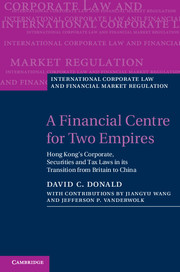 A Financial Centre for Two Empires
A Financial Centre for Two Empires Book contents
- Frontmatter
- Contents
- List of figures
- List of tables
- Preface
- 1 History’s marks on Hong Kong law
- 2 Hong Kong’s economic structure
- 3 Hong Kong corporate and securities laws in response to the Region’s role as China’s international financial centre
- 4 The role of Hong Kong’s tax policies
- 5 Enforcement of corporate and securities law in Hong Kong
- 6 China’s impact on Hong Kong’s position as an international financial centre
- References
- Index
Preface
Published online by Cambridge University Press: 05 June 2014
- Frontmatter
- Contents
- List of figures
- List of tables
- Preface
- 1 History’s marks on Hong Kong law
- 2 Hong Kong’s economic structure
- 3 Hong Kong corporate and securities laws in response to the Region’s role as China’s international financial centre
- 4 The role of Hong Kong’s tax policies
- 5 Enforcement of corporate and securities law in Hong Kong
- 6 China’s impact on Hong Kong’s position as an international financial centre
- References
- Index
Summary
Preface
This examination of Hong Kong offers multiple points of entry into its topic, which is the transformation of a former British colony into China’s international financial centre. My approach contains historical, doctrinal, comparative and empirical analyses. It is my hope that the sum of these various perspectives will be a complete picture of this complex phenomenon, without the gaps, simplifications and blind spots that can limit a legal study employing a single technique. A contribution from Wang Jiangyu, who lives and teaches in Singapore and mainland China, aims to provide insight beyond any home bias for Hong Kong that has crept into my analysis. A contribution from Jeff Vanderwolk, who has studied, practised and taught tax law for decades, ensures that this highly specialized area is addressed with due expertise, from the inside. The result, we hope, is an accurate picture of Hong Kong’s corporate, securities and tax law as it moves from being a component of the British Empire to a Special Administrative Region of China.
The first chapter uncovers the path dependence embedded within Hong Kong’s institutional framework and developmental trajectory. Hong Kong was created as a British-managed, Chinese-inhabited entrepôt to facilitate trade between the British Empire and China; it has become a Chinese international financial centre employing British-origin institutions to serve the growth of the Chinese economy. Hong Kong’s economy and institutions have always looked outward, towards a larger network of relationships into which the city, first as colony and then as Special Administrative Region, fit. Hong Kong is peopled by immigrants steeped in both English ideals of government and Chinese notions of family and community. Thanks to this, the Region can serve as a social experiment for the larger transition of China. The second chapter examines the structure of corporate holdings in the Hong Kong equity market to better understand the risks and hazards that relationships of power pose to investors. Hong Kong is marked by two primary characteristics: controlling shareholders dominate its largest companies and most of its listed companies are incorporated abroad, beyond the control of Hong Kong company law. Two trends accompany these characteristics: controlling shareholdings are increasing, not dissipating, and the mainland Chinese government is replacing Hong Kong families as the controlling shareholder most present on the market.
- Type
- Chapter
- Information
- A Financial Centre for Two EmpiresHong Kong's Corporate, Securities and Tax Laws in its Transition from Britain to China, pp. xi - xivPublisher: Cambridge University PressPrint publication year: 2014


